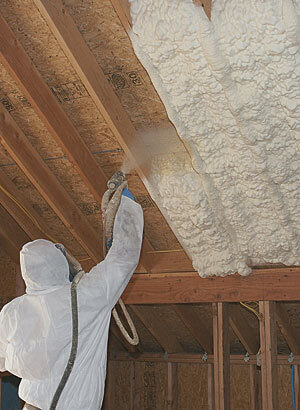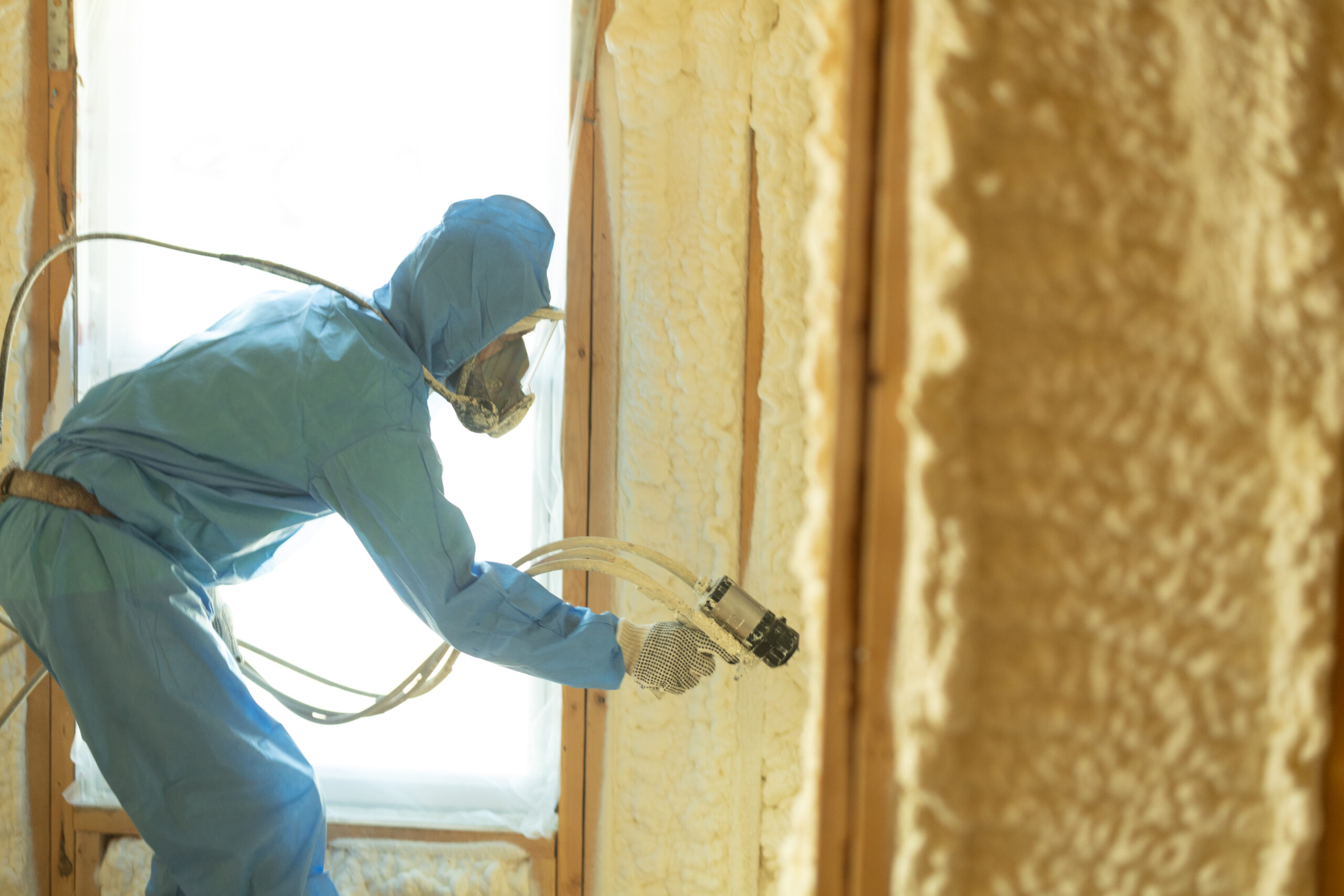Tips for Preserving Your Spray Foam Insulation for Long-Term Efficiency
Tips for Preserving Your Spray Foam Insulation for Long-Term Efficiency
Blog Article
Spray Foam: The Ultimate Solution for Air Sealing and Insulation
Spray foam insulation has emerged as a leading option for reliable air sealing and thermal insulation, offering an one-of-a-kind combination of buildings that set it apart from traditional approaches. Comprehending the complete extent of its benefits, installment processes, and comparisons with various other insulation types is vital for making notified choices.
What Is Spray Foam?
Spray foam is a functional insulation product that combines the concepts of air securing and thermal resistance to improve energy efficiency in structures. Composed mostly of polyurethane or various other similar substances, spray foam is used as a liquid that broadens upon contact with surfaces, developing a strong, continuous layer of insulation. This distinct residential property enables it to fill spaces, splits, and voids that traditional insulation materials might ignore, providing a remarkable air seal.
There are 2 major sorts of spray foam: open-cell and closed-cell. Open-cell spray foam is lighter and much more versatile, using outstanding sound absorption and a lower R-value per inch - Spray Foam. On the other hand, closed-cell spray foam is denser, offering a higher R-value, wetness resistance, and added structural integrity to building parts
The application process typically involves specific equipment, making certain a seamless application that sticks to different substrates, including concrete, wood, and metal. This adaptability makes spray foam appropriate for both brand-new constructions and retrofitting existing frameworks. Its capacity to create an impermeable obstacle significantly adds to lowering energy intake and enhancing interior air high quality, thus making it a recommended option among homeowners and building contractors alike.
Advantages of Spray Foam Insulation
One of one of the most significant advantages of spray foam insulation is its extraordinary capability to create a continual air barrier, which effectively decreases power loss. Unlike conventional insulation materials, spray foam expands to fill up voids and splits, ensuring that air leak is substantially decreased. This particular not only enhances power performance but likewise brings about reduce energy expenses over time.
In addition, spray foam insulation gives exceptional thermal resistance, adding to a much more stable interior environment. Its high R-value per inch allows for reliable insulation in restricted rooms, making it suitable for attic rooms, walls, and crawl rooms. Moreover, the moisture-resistant properties of spray foam aid avoid mold and mildew and mildew growth, promoting much healthier living problems.
Another essential benefit of spray foam insulation is its sound-dampening qualities (Spray Foam). It properly reduces noise transmission in between spaces, producing a quieter and much more comfortable home environment. The durability of spray foam likewise attracts attention, as it does not sag or clear up in time, preserving its performance throughout its life-span
Exactly How Spray Foam Works
Understanding how spray foam insulation functions is necessary for valuing its effectiveness in air securing and thermal resistance. Spray foam insulation includes 2 primary elements: isocyanate and polyol resin. When these parts are combined, they undertake a chemical response that causes the product to increase quickly, producing a dense foam that fills cavities, splits, and voids.
As the foam broadens, it sticks to surfaces, developing an airtight seal that significantly decreases air infiltration. This particular makes spray foam insulation highly reliable at stopping drafts and moisture penetration, which can result in power loss and damage gradually. In addition, the closed-cell version of spray foam offers superior thermal resistance as a result of its rigid framework, successfully decreasing heat transfer.
The distinct residential or commercial properties of spray foam enable it to comply with irregular surfaces, making sure detailed find out here protection and a seamless obstacle. Consequently, spray foam insulation not just enhances energy efficiency but additionally contributes to improved indoor air high quality by lowering the build-up of allergens and pollutants. Inevitably, understanding the mechanics behind spray foam highlights its function as a premium option for insulation and air sealing in both business and residential applications.
Setup Refine Introduction

Before setup, the area needs to be sufficiently cleaned and prepped, guaranteeing that surfaces are complimentary from particles, dirt, and wetness. This action is critical because impurities can endanger bond and general efficiency. Once the location is prepared, the application includes blending the two parts of the spray foam, which broadens upon call and fills spaces properly.
Educated experts ought to conduct the setup, making use of customized devices to make sure uniform insurance coverage and optimal thickness. Security safety measures, consisting of putting on protective gear and guaranteeing appropriate ventilation, are critical throughout this process. After application, the foam commonly cures rapidly, creating a strong barrier that enhances power performance.
Contrasting Spray Foam to Standard Insulation
When evaluating insulation choices, spray foam insulation stands out in contrast to traditional products such as fiberglass and cellulose. Unlike fiberglass and cellulose, which can enable air infiltration, spray foam expands upon application, filling up gaps and spaces to produce an airtight seal.
Furthermore, spray foam supplies a greater R-value per inch than standard insulation types, the original source providing more reliable thermal resistance in a thinner account. This particular is particularly useful precede with minimal dental caries depth. Moreover, spray foam is resistant to moisture and mold development, which can be a substantial issue with cellulose and fiberglass, specifically in humid atmospheres.
However, spray foam insulation typically carries a greater upfront price than its traditional counterparts. House owners need to consider this first financial investment against lasting power savings and efficiency advantages. Ultimately, while both insulation types offer their purpose, spray foam becomes a more advanced option for contemporary insulation demands, especially in terms of air securing and thermal efficiency.

Final Thought
In summary, spray foam insulation represents an extremely effective service for accomplishing optimal air sealing and thermal resistance. Its special buildings, consisting of dampness resistance and audio dampening, make it suitable for various applications in both brand-new buildings and retrofitting jobs (Spray Foam). The preliminary prices may be greater contrasted to traditional insulation materials, the long-term benefits, such as considerable power cost savings and enhanced interior air high quality, warrant the investment and emphasize its pop over to this site value in modern building practices.
Spray foam insulation has actually arised as a leading remedy for efficient air securing and thermal insulation, supplying an unique mix of residential or commercial properties that set it apart from standard methods.Spray foam is a flexible insulation material that combines the principles of air securing and thermal resistance to enhance energy performance in structures.When evaluating insulation choices, spray foam insulation stands out in contrast to standard materials such as fiberglass and cellulose. Inevitably, while both insulation types offer their purpose, spray foam arises as a much more advanced service for contemporary insulation needs, particularly in terms of air securing and thermal performance.
In summary, spray foam insulation stands for a very reliable solution for accomplishing ideal air securing and thermal resistance.
Report this page